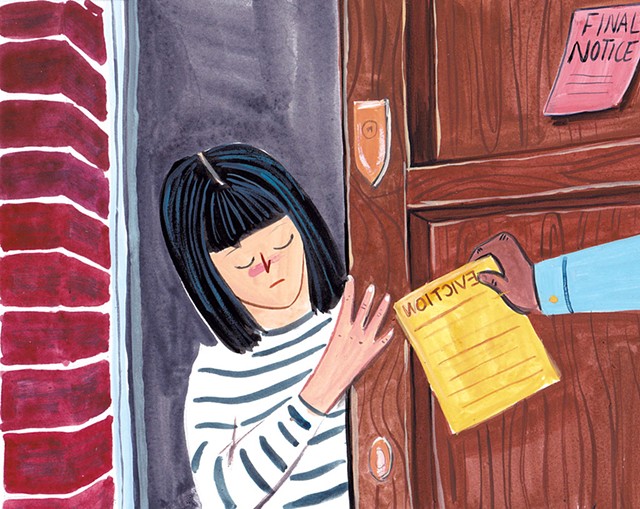Switch to the mobile version of this page.
Vermont's Independent Voice
- News
- Arts+Culture
- Home+Design
- Food
- Cannabis
- Music
- On Screen
- Events
- Jobs
- Obituaries
- Classifieds
- Personals
Browse News
Departments
Browse Arts + Culture
View All
local resources
Browse Food + Drink
View All
Browse Cannabis
View All
-
Culture

'Cannasations' Podcaster Kris Brown Aims to 'Humanize'…
-
True 802

A Burlington Cannabis Shop Plans to Host…
-
Business

Judge Tosses Burlington Cannabiz Owner's Lawsuit
-
Health + Fitness

Vermont's Cannabis Nurse Hotline Answers Health Questions…
-
Business

Waterbury Couple Buy Rare Vermont Cannabis License
Browse Music
View All
Browse On Screen
Browse Events
Browse Classifieds
Browse Personals
-

If you're looking for "I Spys," dating or LTRs, this is your scene.
View Profiles
Special Reports
Pubs+More
Housing Advocates Say State Back-Rent Payments Could Halve Eviction Rate
Published January 16, 2019 at 10:00 a.m. | Updated October 20, 2020 at 9:05 p.m.
Just before Christmas, Tracy heard a sharp knock on the door of the Chittenden County home she shares with her two young boys. A sheriff's deputy handed the 28-year-old nursing assistant a legal notice indicating that she was being evicted from her apartment for nonpayment of rent and needed to be out by January 3.
"It was like, 'Merry Christmas! Find a new home,'" recalled Tracy, who declined to be identified by her real name for fear of further jeopardizing her housing.
The single mom, who lives in a subsidized apartment, got behind on her $340-per-month rent last fall because, unable to afford childcare, she had to stay home to care for her boys during the summer. She figured she'd be able to catch up after they returned to school and she started to work again. But her job search took longer than expected. The boys needed clothes and boots for a winter that came early, and by the time her first paycheck arrived, it was November and three months' rent was due.
"The little bit that I was out of work set me back a lot," Tracy said.
Many low-income Vermonters such as Tracy are just a paycheck or two away from being evicted from their homes, a traumatic, expensive process than can lead to homelessness.
Now, a first-of-its-kind study to be released this week shows that the majority of evictions in Vermont happen not because a tenant has damaged his or her apartment, annoyed neighbors, or engaged in some other unsavory behavior. Instead, according to the Vermont Legal Aid report, most evictions occur simply because tenants are late with rent and can't get current quickly enough to hold on to their homes.
Of the 1,700 eviction filings in the state in 2016, 70 percent were due to nonpayment of rent, the study found.
That surprised Vermont Legal Aid staff attorney Jessica Radbord, who commissioned the report to get a better sense of the scope and nature of evictions in the state.
Because her office often handles the messiest of cases, Radbord had assumed that more evictions were the result of some type of conflict between landlords and tenants, she said. But the realization that so many evictions were caused by tenants getting behind on their rent gave Radbord hope that there might be a simple solution.
What if the state did more to help people avoid eviction by paying their back rent for them? She reasoned that spending a bit of money up front — the average evicted renter owed just $2,000 — made far more sense, financially and morally, than letting people fall into homelessness.
Vermont Legal Aid estimates that by adding $800,000 to housing aid programs, the state could cut its eviction rate in half and probably end up saving money on services for the homeless.
"We can make a pretty big change for not a lot of money," Radbord said. "I believe this would be either cost-neutral or actually save money."
The proposal is one of the core recommendations from the Vermont Legal Aid eviction report. Advance copies have been well received by such legislators as Rep. Tom Stevens (D-Waterbury), the newly named chair of the House Committee on General, Housing and Military Affairs. He called the study compelling and the proposal "a big step" in the right direction.
"We know, through the research that we've been presented over the years, that homelessness prevention saves tons of money," Stevens said.
To be effective, any such program needs to be fast and efficient, characteristics government isn't always known for, he said. But Stevens argued that the potential benefits would likely far outweigh the costs.
If you're on the street, you need emergency services, he said, "versus you're in your home, and your kids can do their homework, and it's warm, and they can take a bath, and they can go to school. These are the tools that a family needs to succeed."
Given the likelihood of a state budget surplus this year, Stevens thinks this might be the time to launch a new rental-assistance program or expand existing ones. Other legislators are more cautious.
"This is coming into a very competitive budgetary environment," said Sen. Jane Kitchel (D-Caledonia), chair of the powerful Senate Appropriations Committee. She cited other obligations and priorities, such as paying down state pension liabilities and fulfilling requests for more higher education funding.
Paying tenants' back rent isn't the only way to keep them in their homes, Kitchel noted. Other strategies include constructing more affordable housing and increasing general assistance to families with children.
"There are a variety of competing ways to address the issues around housing," Kitchel said.
The genesis of the Vermont Legal Aid report is as compelling as some of its findings.
Radbord was conducting a training clinic for pro bono attorneys in Montpelier a year and a half ago when her co-presenter, Angela Zaikowski, head of the Vermont Landlords Association, urged participants to read Matthew Desmond's 2016 book Evicted: Poverty and Profit in the American City.
Desmond, a professor at Princeton University, runs a research project called the Eviction Lab, which uses public records to track evictions throughout the country. It listed only 39 in the entire state of Vermont in 2016.
Radbord knew that was a preposterously low number, given the volume of cases her office alone handles every year. So she decided to get to the bottom of not just how many evictions there were in the state but what was driving them. She asked two Vermont Legal Aid interns, Peter Beck and Isaac Scher, to dive into the subject.
Beck focused on data from Windsor and Lamoille counties, while Scher conducted interviews with tenants from across the state who faced eviction.
The researchers found that just over 2 percent of households in Windsor and Lamoille were subject to an eviction process in 2016. When unpaid rent was at issue, the median amount due was only $2,000.
The landlord had a lawyer in three out of four cases, and the tenant didn't. Perhaps not coincidentally, in three out of four instances, tenants wound up getting evicted. That's despite the fact that, in 43 percent of cases, the eviction notice or complaint did not comply with legal requirements.
The data jibed with Radbord's own experience. She has found that, in many cases, tenants are evicted after getting behind by just a few hundred dollars.
"One car breakdown, and you're out of luck," she said.
Those relatively modest debts, however, can quickly snowball if tenants are taken to court.
There's the $295 court filing fee and $50-per-tenant process service fee, not to mention mileage and postage, all of which the tenant can be required to repay in addition to the back payments. And throughout the process, which can take months, back rent mounts.
Landlords bear significant costs in the eviction process, as well, including legal fees and lost revenue from units going unrented. Even when they win in court, collecting can be challenging.
For this reason, landlords are usually highly motivated to find an alternative to eviction, said Nadine Scibek, an attorney who represents a number of major Vermont landlords, including affordable-housing providers.
"Landlords are not out to throw people out on the street," Scibek said. "They just want people to pay the rent, be good neighbors and follow the lease."
She and her affordable-housing clients, in particular, work with tenants who demonstrate a willingness to resolve issues in a way that will allow them to stay in their units, Scibek said.
The state already provides some back-rent assistance, but advocates say it's not enough. Last year, the state spent $6.9 million addressing or preventing homelessness through the Housing Opportunity Grant Program, or HOP. The bulk of that money went to agencies helping the homeless, while $1.5 million funded services aimed at helping prevent people from becoming so, explained Sarah Phillips, director of the state's Office of Economic Opportunity.
Of that prevention pot, $367,933 was spent on rental assistance, which includes ongoing rent and rental arrears for those at risk of homelessness. The department works with service providers to ensure a variety of strategies are used to prevent evictions, Phillips said.
One of those providers, Chittenden Community Action, would welcome an increase in the HOP funds it distributes to low-income residents in conjunction with counseling aimed at helping people better manage their money, said director Travis Poulin.
The organization distributed $135,000 to 174 families last year to help with security deposits or rental assistance intended to keep tenants in their homes. They were not able to help 45 families that had sought assistance.
There could have been a variety of reasons for this, Poulin said, but in many cases it's because potential recipients aren't poor enough. The HOP funds are largely restricted to those who earn 30 percent of the median household income. For a family of four in Burlington last year, that amounted to $27,550.
According to Poulin, many Vermonters make more money than that but still struggle with the high cost of housing and utilities.
If additional money became available, one way to expand the program might be to loosen its income restrictions and open it up to those making up to 50 percent of the median income, or $45,912 for a family of four.
"The more money we have available, the more people we'll be able to serve," Poulin said. "It's really that simple."
In Tracy's case, once her boys returned to school and she found work, paying her modest rent wasn't a problem. But digging herself out of the back-rent hole was.
In the end, her landlord gave her another chance, allowing her to remain in her home while she caught up on her rent. But she wonders whether a more robust back-rent program might have kept her from getting hauled into court.
She credited the last-minute intervention by advocacy groups, including Legal Services Law Line of Vermont and Vermont Legal Aid, with her reprieve from eviction.
"Without them, I would have been homeless," she said.
Read the Vermont Legal Aid report below:
Related Stories
Got something to say?
Send a letter to the editor
and we'll publish your feedback in print!
Tags: Real Estate, Housing, eviction, rent payments, homelessness
More By This Author
About The Author

Kevin McCallum
Bio:
Kevin McCallum is a political reporter at Seven Days, covering the Statehouse and state government. He previously was a reporter at The Press Democrat in Santa Rosa, Calif.
Kevin McCallum is a political reporter at Seven Days, covering the Statehouse and state government. He previously was a reporter at The Press Democrat in Santa Rosa, Calif.
Speaking of...
-

Barre to Sell Two Parking Lots for $1 to Housing Developer
Apr 22, 2024 -

Ethics Panel Dismisses Complaint Against Ram Hinsdale
Apr 11, 2024 -

Another Round of Motel Evictions Sparks Confusion, Frustration and a Rush to Erect Temporary Shelters
Mar 19, 2024 -

State to Open Temporary Homeless Shelter in Downtown Burlington
Mar 14, 2024 -

Burlington Considers Zoning Changes to Encourage More Home Building
Mar 6, 2024 - More »
Comments (11)
Showing 1-10 of 11
Comments are closed.
From 2014-2020, Seven Days allowed readers to comment on all stories posted on our website. While we've appreciated the suggestions and insights, right now Seven Days is prioritizing our core mission — producing high-quality, responsible local journalism — over moderating online debates between readers.
To criticize, correct or praise our reporting, please send us a letter to the editor or send us a tip. We’ll check it out and report the results.
Online comments may return when we have better tech tools for managing them. Thanks for reading.
- 1. A Room of Her Own: In Shelburne, a Backyard Cottage Provides Both a Haven and a Gathering Place DIY Home
- 2. Original Glory: A Five-Year Renovation Turns Charlotte's '1812 Tavern' Into a Stunning Family Home Steeped in History Home Tours
- 3. Home Is Where the Target Is: Suburban SoBu Builds a Downtown Neighborhood Real Estate
- 4. Nest — Spring 2024 Nest
- 5. Last Quarter: Spring 2024 Vermont Housing News Real Estate










































